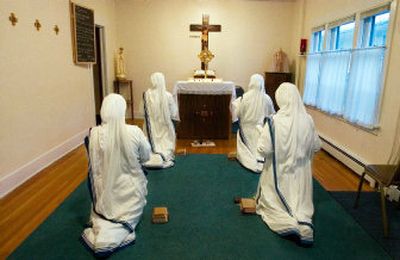Tackling a different poverty

In the silence of the sanctuary, four nuns fall to their knees in prayer.
“Dear Jesus, help us to spread your fragrance everywhere we go,” they beseech before a simple altar. Behind it, a large, wooden crucifix on the wall has a sign next to it that says, “I thirst,” written in blocked letters by hand. “Flood our souls with your spirit and life.”
Several times a day, for a total of more than four hours, these women devote their lives to prayer. Through silent meditation and by reciting the rosary, novenas and other Catholic prayers, the nuns draw strength to fuel their new mission: to reach out to the suffering in Spokane.
After serving the poor in Calcutta’s slums, in the alleys of inner-city Los Angeles and other destitute areas around the globe, four sisters from Mother Teresa’s Missionaries of Charity have brought their ministry to Hillyard.
“We saw a need,” said Sister Alinda, describing the neighborhood’s struggle with drugs, alcohol and other problems. “It’s a very poor area. Our work requires us to do whatever we can for people in need.”
Poverty in Spokane, as is the case in many parts of the United States, isn’t so much a lack of food and basic necessities like so many places in the world, explained Sister Shanti Prabha. Rather, it is a “spiritual poverty,” said the nun – a struggle with loneliness, desperation and misery. “That’s the worst kind,” she said.
Nearly two months ago, the sisters moved into a vacant convent on North Lacey Street – a small, cream-colored house with reddish trim, located next to the playground of St. Patrick Catholic School. They came as a result of numerous requests from parishioners at St. Pat’s, as well as the efforts of their pastor, the Rev. Dan Barnett.
Barnett, who also serves as pastor of St. Francis Xavier and the Spokane Diocese’s new vocations director, had worked with the Missionaries of Charity when he was a seminarian in Italy.
About three years after Bishop William Skylstad wrote his first letter to Sister Nirmala, Mother Teresa’s successor, asking the Missionaries of Charity to Spokane, the request was granted.
In late February, the four nuns – Alinda, Shanti Prabha, Bernadette Ann and Joshua Marie – were welcomed by the bishop and St. Patrick parishioners with a special Mass, a reception and a procession to the convent.
The nuns’ ministry in Hillyard is among the order’s newest missions and is the first time that Mother Teresa’s order has established a presence in this part of the country. Founded in 1950, the Missionaries of Charity is made up of more than 4,500 sisters, an associated brotherhood of about 300 members, and tens of thousands of lay volunteers who operate roughly 600 missions in 130 countries.
“We feel at home here,” said Sister Alinda, who was working in Tijuana, Mexico, before she was asked to move to Spokane. “People have been very kind.”
All but Sister Joshua Marie, who grew up in Chicago, were born and grew up in India. She and Sister Bernadette Ann are relatively new to the order, but Sisters Alinda and Shanti Prabha have been with Missionaries of Charity for more than two decades.
Like others in the order, all four women lead a simple and disciplined life – rising each day at 4:40 a.m. for prayer and meditation at 5 a.m. They each own two sets of clothing that they wash by hand since the order does not allow the use of appliances and other modern conveniences. The sisters also refrain from watching television or listening to radio.
They receive no compensation for their work and are actually completely dependent on “Divine Providence” for food and other basic necessities. “We live a life of poverty,” said Sister Shanti Prabha. “But God never abandons us.”
They spend several hours a day knocking on doors, visiting shut-ins, talking to the elderly in nursing homes, meeting families. They often stand out in their distinctive blue-bordered white saris – talking to the homeless and others on the streets, praying the rosary aloud as they walk along the sidewalks of Hillyard.
Most people they’ve encountered have been friendly, usually greeting the nuns with a “hi,” a smile or a wave of the hand. But the women also have run into individuals who have been drunk or high on drugs, as well as others who have begged them for money.
“Our work is not conversion,” said Sister Alinda. “We are here to give God’s love to others.”
Most of their time is spent in prayer, kneeling on the floor of the convent’s small chapel – a quiet, austere room adorned only by the crucifix, a large statue of the Virgin Mary, small wooden plaques for the Stations of the Cross and a framed color photograph of a smiling Mother Teresa.
“Without prayer we could not do what we do,” said Sister Alinda. “Strength comes from our relationship with God.”